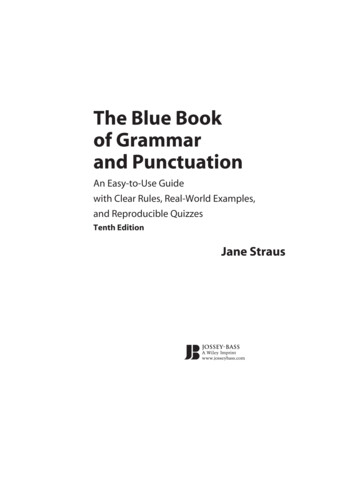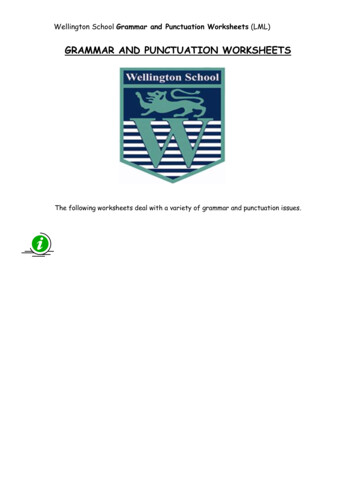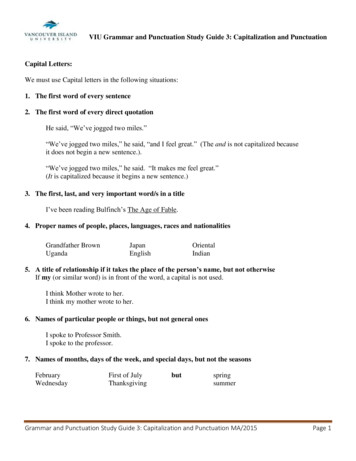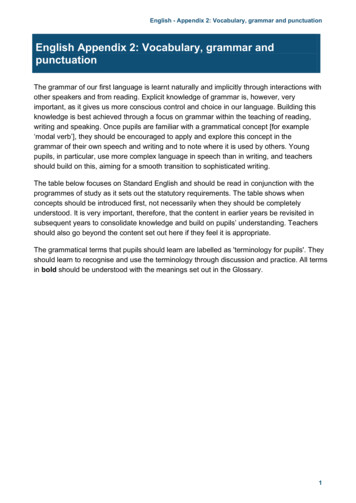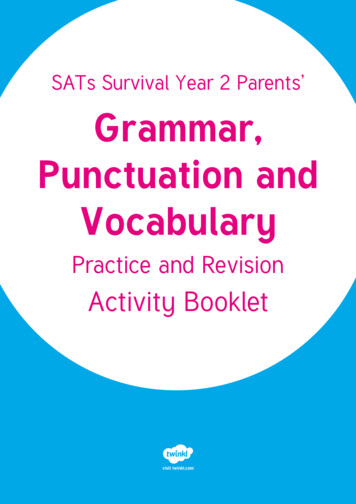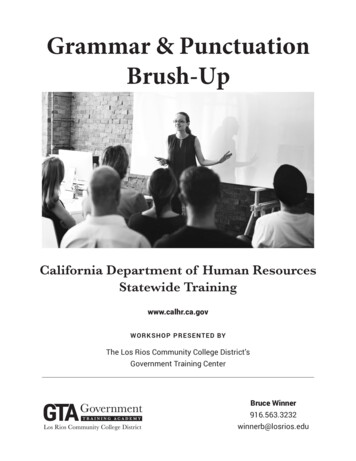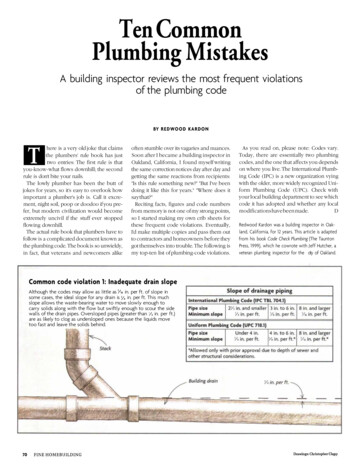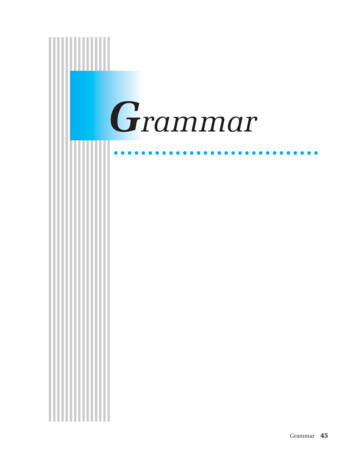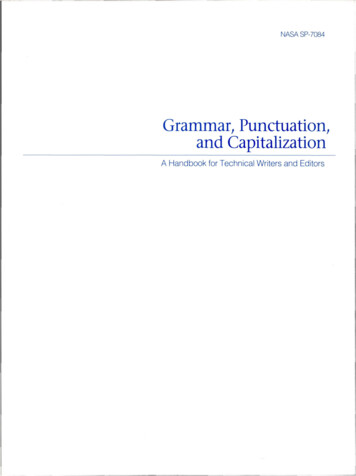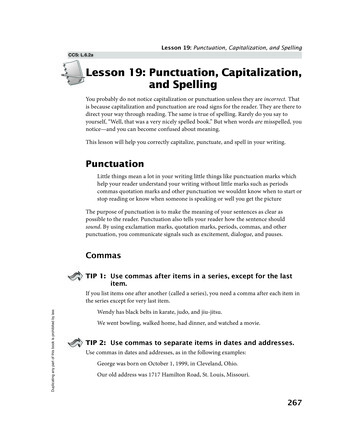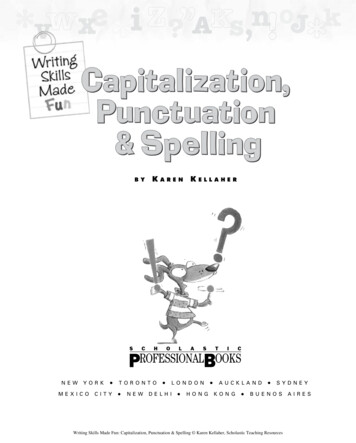
Transcription
Ten Common Grammar and Punctuation Mistakes(Adapted from Michael Alley, “The Craft of Scientific Writing”, Prentice-Hall, New York, 1987)1. Subject Verb DisagreementExample of obvious mistakes:The flash photolysis experiment don’t work good.The singular subject “experiment” takes the singular verb “doesn’t”. The adverbial form of theadjective “good” should be used to modify the verb “work”.The flash photolysis experiment doesn’t work well.The following sentences are examples where subject-verb agreement is correctly achieved oncethe subject is correctly identified as singular or plural:A series of measurements generally yields a more accurate final value. This sentence is correct.There is one “series”, so the singular verb “yields” is used.This group of students looks bored. Group is singular so it takes the-singular verb “looks”.Praseodymium and dysprosium are rare earth metals. If the subject consists of two or morenouns joined by and, the subject is plural. If a subject consists of two or more singular nounsjoined by or or, either or, or neither nor, the subject is singular and requires a singularverb.Neither oxygen nor nitrogen is a noble gas.Either silicon or gallium arsenide is used in that type of solar cell.2. Comma SpliceA comma splice is a comma that joins two independent clauses. You should replace commasplices with either periods or semicolons.
Incorrect:The teaching assistant had explicitly warned all the students not to make that particular mistake,however, several students didn’t go to the pre-lab discussion so they made the mistake anyway.Correct:The teaching assistant had explicitly warned all the students not to make that particular mistake;however, several students didn’t go to the pre-lab discussion so they made the mistake anyway.The teaching assistant had explicitly warned all the students not to make that particular mistake.However, several students didn’t go to the pre-lab discussion so they made the mistake anyway.3. Ambiguous Pronoun ReferenceA pronoun refers to the last noun used. You can stretch this rule somewhat, but not to the pointof introducing ambiguity.Ambiguous:The experiments that gave those very interesting results were done by two graduate students.They helped to settle a controversial issue.Did the results, the students, or the experiments help to settle the issue? As written, it implies thestudents helped, but it is ambiguous.Clearer versions:The experiments that gave those very interesting results were done by two graduate students.Those results helped to settle a controversial issue.
The experiments that gave those very interesting results were done by two graduate students.These experiments helped to settle a controversial issue.The experiments that gave those very interesting results were done by two graduate students.These students helped to settle a controversial issue.Or (better):By doing the experiments that gave those very interesting results, two graduate students helpedsettle a controversial issue.4. Dangling ModifiersNeglecting costs, Option A is the best choice because of its high thermal efficiency.Did Option A “neglect” the costs? You should group introductory participle phrases with thenouns they modify.Neglecting costs, we found that Option A is the best choice because of its high thermal efficiency.5. Dropping the Last Comma in a Series of Three or More TermsClarity is more important than rhythm in scientific writing. The opposite is often true inliterature.Carbon, silicon, germanium, and seleniumNeopentane, perdeuteroneopentane, or neooctane6. “Which” for “That” and Vice Versa
This is one of the most common mistakes and is often made by relatively good writers. Use“that” for defining clauses. Use “which” for non-defining or parenthetical clauses. If you canomit the clause without crippling the sentence, use “which”. Otherwise, use “that”. Note that“which” clauses require enclosing commas. “That” clauses do not.We will use the IR spectrometer that has the higher wavelength accuracy. (Tells which one.)We will use the FTIR spectrometer, which has a higher wavelength accuracy than a dispersiveIR spectrometer. (Adds a fact about the known option.)7. Misplacing Quotation MarksClosing quotation marks should go outside of periods and commas.The professor said, “Any student who does not turn in a lab report within two weeks of the duedate will fail the course.”8. Misforming PossessivesForm the possessive singular of nouns by adding ’s, no matter what the final letter is.Yates’s bookPlanck’s constantThe octopus’s eyesThe possessives of the pronouns hers, theirs, yours, ours and its have no apostrophe.“Its” is the possessive of “it”.“It’s” is the contraction of “it is”.9. Hyphenating Compound WordsCompound words are common in scientific writing. There are no definite rules. If the compoundis not found in a dictionary, use the following two principles: The trend is away from the use ofhyphens in compound words.
Ion gauge, ideal gas law, reaction rate, partition function, etc.When compounds appear as adjectives before nouns, use a hyphen to avoid misleading thereader. Therefore, write:Reaction-rate measurementsargon-ion laserphotoelectron-spectrometer design10. Capitalizing Every Part of an Experiment, Theory or DesignCapital letters also increase the complexity of writing. Although you must use capital letters forproper nouns and the beginning of sentences, you should use lower case letters wheneverpossible.Wrong:In our Liquid Sodium Receiver Experiment a Power Production Phase will follow the Test andEvaluation Phase.Right:In our liquid sodium receiver experiment, a power production phase will follow the test andevaluation phase.
Ten Common Grammar and Punctuation Mistakes (Adapted from Michael Alley, “The Craft of Scientific Writing”, Prentice-Hall, New York, 1987) 1. Subject Verb Disagreement Example of obvious mistakes: The flash photolysis experiment don’t work good. The singula
